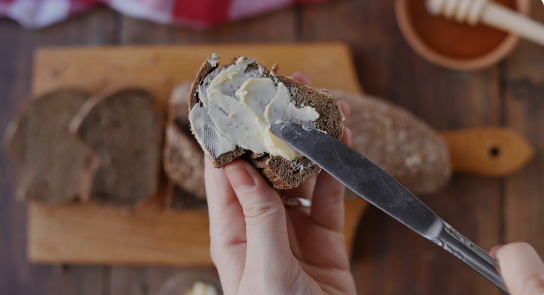“Cooking Essentials: Navigating the Choice Between Butter and Vegetable Oil for Health and Flavor. The ongoing debate between butter and vegetable oil, two kitchen stalwarts, has persisted for years. Each possesses distinct characteristics, imparting unique flavors and textures to our beloved dishes. While butter contributes its velvety texture and savory richness, oil provides a glossy sheen and depth. Despite their culinary merits, both have faced scrutiny for their perceived impact on health, primarily due to fats.
Recommendations for saturated fats are to be kept under 7% of total calories.’ Concerns range from butter’s potential impact on cholesterol to the notion that cooking oil may introduce unhealthy fats devoid of flavor. To unravel the truth, let’s explore the health implications and determine the better choice for your recipes: butter or oil?”

Butter, a beloved kitchen ingredient, is a dairy product made from churning cream. It’s a source of saturated fats, essential for hormone production and absorption of fat-soluble vitamins. However, excessive consumption may contribute to high cholesterol. The debate around butter centres on its saturated fat content, with some studies like Harvard Public Health suggesting a link to heart disease.
“Vegetable oil, a plant-based substitute, is derived from seeds, nuts, or fruits. Celebrated for its abundance of unsaturated fats, it plays a role in promoting heart health and reducing levels of harmful cholesterol. Nevertheless, certain vegetable oils might undergo processing methods that diminish their nutritional value. Studies indicate that excessive intake of specific vegetable oils, particularly those high in omega-6 fatty acids, could potentially contribute to inflammation.”
For Cooking:
When it comes to cooking, both butter and vegetable oil showcase their advantages. Butter imparts a rich flavor to sautéed dishes and gives a golden crust to pan-seared meats. However, its lower smoke point makes it less suitable for high-temperature cooking. On the other hand, vegetable oil, with its higher smoke point, excels in stir-frying and deep-frying. From a health perspective, experts, including the American Heart Association, advocate for balance, recommending vegetable oils with higher unsaturated fats for regular cooking to maintain heart health.

For Baking:
In the realm of baking, the choice between butter and vegetable oil significantly influences the texture and taste of your treats. Butter lends a rich, creamy flavor to cookies and cakes, creating a desirable crumbly texture. Conversely, vegetable oil introduces moisture, resulting in a lighter and fluffier end product. Health-conscious bakers often experiment with substitutes like applesauce or yogurt for a balance between flavor and nutritional value. Nevertheless, many chefs advise a combination of both for a perfect harmony of flavor and texture.

For Non-Heat Recipes:
Beyond the stove and oven, both butter and vegetable oil find their place in non-cooking recipes. In salad dressings or cold dishes, the lightness of vegetable oil allows it to blend seamlessly. Softened butter enhances the texture of spreads and icings. For health-conscious choices, chefs, nutritionists, and even the Mayo Clinic recommend plant-based oils instead of butter as a versatile and heart-healthy option in non-cooking recipes. It adds a pleasant depth of flavor without compromising nutritional benefits.

Butter Vs Oil: The Winner?
In the ongoing dilemma of butter vs. vegetable oil, there’s no one-size-fits-all answer. According to experts, “Butter is a saturated fat source, vegetable oils are rich in poly and mono-saturated fat. Butter is a healthy choice in combination with vegetable oils for growing children. For adults, nuts, seeds, and non-veg food also add saturated fats, so it is important to be judicious about using butter or oil.” Both play distinct roles, offering unique flavors, textures, and nutritional profiles.

The key lies in moderation, choosing based on the cooking method, and considering individual health goals.
